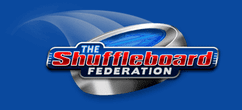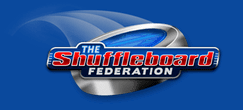How To Pick The Table Shuffleboard Powder For Your Shuffleboard Table
Table Shuffleboard Powder, Wax Shuffleboard Sand, Speed Powder, Sawdust, Salt, Shuffleboard Dust: What Is It?
What do you sprinkle on a Shuffleboard Table? This essential product goes by many names, among them, Shuffleboard Powder, Sand, Powdered Wax, Dust, Shuffleboard Sawdust, Speed Powder, and Shuffleboard Salt, to name a few. Choosing the right product for your table will increase your enjoyment level and increase scoring. Our Shuffleboard Wax / Shuffleboard Sand / Shuffleboard Speed Powder FAQ's will help you pick the right product for your table.
Does Shuffleboard Wax / Sand / Speed Powder Contain Walnut Shells
Ground walnut shells have been used as a principal component
of The Shuffleboard Federation’s
Ultra Glide™ Powdered Shuffleboard Table Wax products for over 30 years.
Through a proprietary mix of finely ground walnut shells and
White Lightning® Speed Regulator, The Shuffleboard Federation has developed
the most consistent table shuffleboard powders available. Because of the use of
walnut-based materials, The Shuffleboard Federation often receives questions
related to walnut allergies and allergic reactions.
Walnuts (Juglandaceae) are a member of the Tree Nut family, and as such, have
been reported to cause allergic reactions in sensitive individuals. Tree Nut
allergy is common, and reactions range from mild itching of the mouth to
anaphylaxis. The reported incidence of Tree Nut allergies varies based on
region, age, race/ethnicity, and the definition used for diagnosis but typically
affects ~0.05%–2.0% of the population, with children being the most highly
affected group. Specifically, walnuts have been estimated to contribute 20-30%
[MM([3] of the total Tree Nut allergy incidence in the United States.
Nearly all reported allergic reactions to walnuts are the result of ingestion of
the dried fruit (or kernel). Through component-resolved diagnostics, at least 5
different proteins (Jug r 1-5) have been identified in the walnut kernel that
can cause allergic reactions in people. These proteins have not been shown to
occur in the walnut shell. Ingestion is not anticipated to occur under normal
use conditions for Table Shuffleboard Wax.
Walnut shell has not been shown to cause skin sensitization through exposure.
That said, walnut shell Material Safety Data Sheets (MSDS) and warning labels
for products containing walnut shells often recognize risks of allergic
reaction. This is typically due to the potential for trace amounts of walnut
kernel to remain in the shell during processing and thus enter the finished
product. Walnut shells are regularly used in the cosmetic industry as an
abrasive exfoliant where extensive skin exposure occurs without incident.
Similarly, skin contact is not considered a hazard for shuffleboard wax
containing walnut shells. Walnut shells have not been shown to present an acute
toxicity hazard.
There are several case reports of contact dermatitis and skin
hyperpigmentation related to dermal exposure to the green outer flesh (hull or
husk) of walnuts during harvest or preliminary processing. The active aromatic
napthoquinone (Juglone) has been shown to cause the irritation. Juglone has been
isolated from the hull but has not been identified in the shell of the walnut,
and skin irritation or dermatitis has not been reported for the dried shell.
Disclaimer: The following review of available data for walnut allergies is
for informational purposes and provides an overview for the general population.
It is NOT intended to be a substitute for professional medical advice,
diagnosis, or treatment. Always seek the advice of your physician or other
qualified health care provider for any individual concerns, conditions, or
treatments.
© Copyright 2023, The Shuffleboard Federation, All Rights Reserved.





